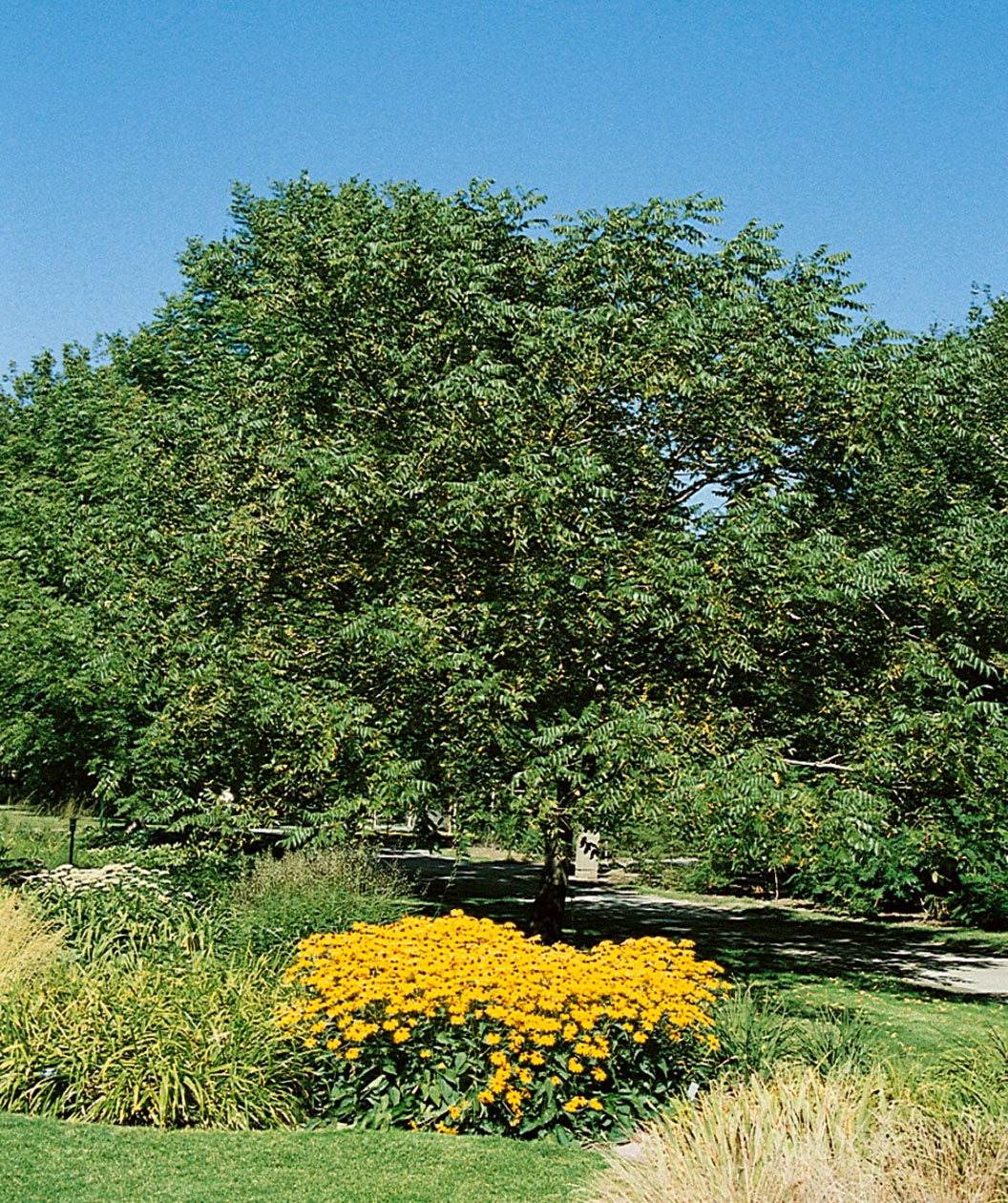


SAVORY AND RICH BUTTERNUTS IN OCTOBER
FEATURES:
- Yellow-green flowers emerge in late spring before giving way to the butternuts
- Dark green leaves turn hues of yellow come fall
- Self-fertile, meaning only one is needed for nut production - however, your harvest will be larger with multiple trees
- Butternuts are commonly used in baking or eating fresh due to their rich, buttery flavoring
- One of the hardiest nut producing trees
-
Nuts are a popular food source for birds, deer, and squirrels
- Hand selected fresh from our grower
- Ships in a plant-safe designed box
Growth Facts
- Hardiness Zone: 3-7
- Mature Height: 40-60' tall
- Mature Width: 35-50' wide
- Exposure: Full Sun
- Spacing: 40-50' apart
SAVORY AND RICH BUTTERNUTS IN OCTOBER
FEATURES:
- Yellow-green flowers emerge in late spring before giving way to the butternuts
- Dark green leaves turn hues of yellow come fall
- Self-fertile, meaning only one is needed for nut production - however, your harvest will be larger with multiple trees
- Butternuts are commonly used in baking or eating fresh due to their rich, buttery flavoring
- One of the hardiest nut producing trees
-
Nuts are a popular food source for birds, deer, and squirrels
- Hand selected fresh from our grower
- Ships in a plant-safe designed box
Growth Facts
- Hardiness Zone: 3-7
- Mature Height: 40-60' tall
- Mature Width: 35-50' wide
- Exposure: Full Sun
- Spacing: 40-50' apart
Why plant Butternut Treeling?
A bonanza for birds! Butternut is a Black Walnut relative that offers valuable sustenance to birds. A host to over 130 species of moths and butterflies, that means one thing to birds: caterpillars! Packed with protein and fat, these succulent morsels serve as songbirds’ most important food source when raising their chicks. Sweet, tasty, energy-rich nuts in fall are relished, too—with some help. The shells are hard to break open. If you crack some open and put them in your birdfeeder, the chickadees, cardinals, titmice, nuthatches, grosbeaks, and sparrows will soon be by for a bite.
Butternut is native to most of the eastern states, from Minnesota to Maine in the North and from Arkansas to Georgia in the South. Once valued for its light, easily worked heartwood as well as the yellow-orange dye in its inner bark, this coveted tree was already overharvested when a devastating disease struck. Since at least the 1960s, a canker has killed large numbers of Butternut Trees, especially in the Midwest and New England. There is no cure for the disease, but researchers are working hard to find resistant trees. Grow a Butternut of your own and be a part of the effort to keep this noble native around!
How to use Butternut Treeling in the landscape?
Among the many, many moths that Butternut supports are some of our largest and most dramatic native insects. Its foliage feeds cecropia, io, luna, polyphemus, imperial, royal Walnut, and Walnut sphinx moths.
Planting Zones
Hardiness Zone: 3-7
How To Plant Butternut Treeling
Butternut is native to both good and poor sites, but it does much better when given some love. Plant it in full sun, in deep, moist, fertile soil and irrigate regularly when rain doesn’t fall. It is a moderately slow grower, even under the best of circumstances. This species has a more northernly distribution than its close relative, the Black Walnut, and it is cold-hardy to 40 below zero. It also prefers more acidic soils. Before planting, check with your local extension office on the prevalence of Butternut canker in your area. This destructive disease is still an issue.
How Does Shipping Work?
Bower & Branch Trees, the real BIG trees, don’t fit in a box! Our big trees, sizes XL and bigger, require expert delivery and care, that means our extra-large trees are shipped on Bower & Branch trucks. We are the only ones who know how to ship our big and bigger trees and plants with tender loving care. We deliver your trees and plants directly to you. Ask Bower & Branch about planting services – we'd be happy to assist in installation.
*For Big trees and Shrubs, Size XL and bigger: Review our Seasonal Shipping Timelines and Policy here.
Your trees and plants are grown across the United States at various Bower & Branch Growers. Depending on your location, your plant orders may be shipped from various locations. Please expect orders with multiple items to be delivered over a number of days as a result. Orders made up of numerous items or selections will not arrive at your home on the same day.
Shipping Delays:
From time to time, Bower & Branch Growers may determine to delay order shipment based on various factors for plant health. Weather in your region, as well as, where your plants are grown, is always considered when shipping. Extreme weather conditions may delay some or all of your order. Bower & Branch allows our Growers to make final shipping decisions based solely to benefit your trees and plants’ health and success.
How Does Sizing Work?
The size of our trees have nothing to do with the container size like you may find elsewhere–big doesn't mean just height - it’s also vigor, age, and overall health. Other online retailers are going to tell you that a plant is a seven gallon, that means nothing to your tree or plant (or you.)
Our trees for sale online are graded on large, x-large, and even bigger sizes. This is because our trees are sized by their age—the higher the letter, the more mature the tree. The age determines the trees’ overall height, size of the trunk and the overall branch density.
All of these characteristics are what you should be looking for when choosing a tree for immediate impact and instant curb appeal. Our extra-large tree and plant sizes are sure to wow you and your neighbors!
See the size guides below.










